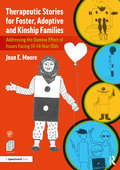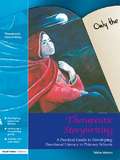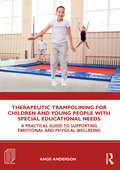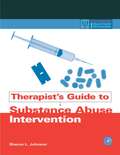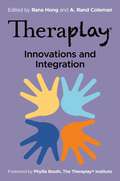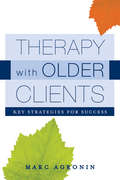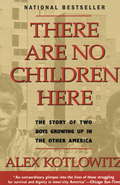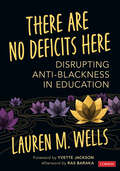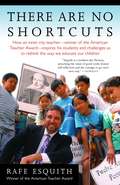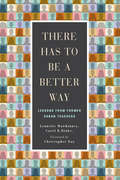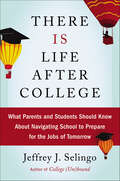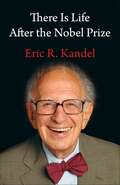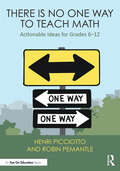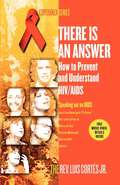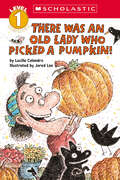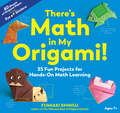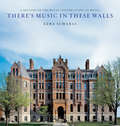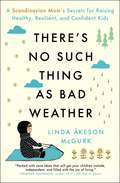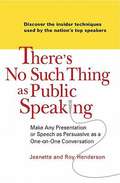- Table View
- List View
Therapeutic Stories for Foster, Adoptive and Kinship Families: Addressing the Domino Effect of Issues Facing 10–14-Year-Olds
by Joan E. MooreThis accessible resource contains therapeutic stories and guidance for adults who are supporting young people aged 10–14 in foster, adoptive or kinship families. With a solution-focused approach, the stories are designed to address a range of social and emotional problems, covering topics such as bullying, eating disorders, trauma, parents’ health, homophobia and racism. Each story is accompanied by relevant context and theory, discussion points and creative activities that will stimulate the young person’s problem-solving skills and imagination, empowering them to explore solutions to situations in their own lives. Key features include: 35 therapeutic stories created to help young people make sense of their experiences, illustrating empathetic responses and solutions to social and emotional difficulties. Discussion points and related activities based on the author’s extensive practical experience and knowledge. Practice guidelines and case studies to illustrate how the story-making approach can be used by therapists, adoptive parents, social workers and teachers. Photocopiable and downloadable resources. This book will enable foster, adoptive and kinship parents, social workers, therapists, teachers and other professionals to support the young people with whom they are working to resolve their dilemmas and enhance their self-esteem.
Therapeutic Storywriting: A Practical Guide to Developing Emotional Literacy in Primary Schools
by Trisha WatersLiteracy work can provide a therapeutic context in which to support children with emotional and behavioural difficulties in mainstream schools. This text provides a clear theoretical rationale for therapeutic storywriting.
Therapeutic Trampolining for Children and Young People with Special Educational Needs: A Practical Guide to Supporting Emotional and Physical Wellbeing
by Ange AndersonThis practical resource explores the benefits of therapeutic trampolining on children and young people with special educational needs. It supports practitioners as they introduce the trampoline into their own therapeutic settings. Trampolining is known to improve balance, co-ordination and motor skills; it can improve bone density and benefit the lymphatic and cardiovascular systems. It has even shown to encourage communication in children with autism and PMLD. This book draws on the author’s extensive experience of delivering both the British Gymnastics Trampoline Proficiency Award scheme as well as the Rebound Therapy trampolining programme. The book also explores the practical side on how to set up and deliver trampolining as a therapy in schools, clubs or in the home. Photocopiable material includes: Lesson equipment, such as schemes of work, lesson plans adapted for varying needs and a trampoline rules poster. Tools for offering therapeutic trampolining sessions such as sequencing cards, communication cards, Risk Assessment, an individual education plan and a communication placemat. All the necessary forms to ensure a safe trampolining environment for all participants, including screening forms, referral and assessment forms and relevant policies. A business plan for after school provision, advertising leaflet and service level agreement. This is an invaluable resource for anybody looking to explore therapeutic trampolining as a way of enhancing the physical and emotional wellbeing of children and young people with special educational needs.
Therapeutisches Erzählen lernen: Das Wichtigste im Überblick (Psychotherapie: Praxis)
by Stefan HammelDas Buch gibt eine hypnosystemisch fundierte Einführung in das therapeutische Erzählen in Medizin, Kindertherapie und Erwachsenenpsychotherapie, Paartherapie, Familientherapie, Sozialarbeit, Seelsorge, Pädagogik, Coaching, Supervision und verwandten Berufsfeldern. Aus dem Inhalt: Was Geschichtenerzählen mit Therapie zu tun hat. Warum, wann und wie Geschichten therapeutisch wirken. Wo ich therapeutische Geschichten einsetzen kann. Wie ich die rechte Geschichte zur rechten Zeit finde. Wie ich eine therapeutische Geschichte strukturiere. Wie ich anfange und wie ich weitermache. Wie ich meine erzählerischen Fähigkeiten erweitere. Über den Autor: Stefan Hammel arbeitet als systemischer Therapeut, Hypnotherapeut und Autor, als evangelischer Klinik- und Psychiatrieseelsorger sowie als Leiter des Instituts für Hypnosystemische Beratung in Kaiserslautern und als Referent systemischer und hypnotherapeutischer Ausbildungsinstitute in Deutschland, Österreich und in der Schweiz. Er hält Seminare zu Erickson'scher Hypnotherapie, therapeutischem Erzählen, systemischer und hypnosystemischer Beratung. Arbeitsschwerpunkte liegen in den Bereichen Paar- und Familientherapie, Kinder- und Jugendlichentherapie, Depression, Angst, Trauma, Sterbe- und Trauerbegleitung sowie der Unterstützung somatischer Heilung.
Therapist's Guide to Substance Abuse Intervention
by Sharon L. JohnsonAuthor of AP's bestselling "Therapist's Guide to Clinical Intervention" now turns her attention to substance abuse intervention. The book will follow a similar format to her previous book, presenting information in easy to read outline form, with relevant forms, patient questionnaires, checklists, business documents, etc. Part I discusses the social impact of substance abuse and provides a general overview of the physiological and psychological characteristics of abuse, DSM IV definition of abuse, and classifications of the varying types of drugs. Part II is the main section of the book and covers assessment, different stages of abuse/recovery, and treatment choices. Coverage includes the discussion of myriad self-help choices (e.g. AA), group therapy, brief therapy, and more. Discussion will also include making a determination of treatment as inpatient or outpatient, and issues relevant to special populations (teenagers, geriatrics, comorbidity patients, etc.). Part III presents skill building resources. Part IV covers prevention, quality assurance, and also includes a glossary. The book, Outlines treatment goals and objectives, Outlines for assessing special circumstances, offers skill building resources to supplement treatment.
Theraplay® – Innovations and Integration (Theraplay® Books & Resources)
by Rana Hong and A. Rand ColemanOfficially endorsed by The Theraplay® Institute, this handbook builds on the core concepts of Theraplay® and explores innovative ways to integrate the approach with other therapeutic models for diverse settings and client groups. The book features chapters on the neurobiology of Theraplay®, Tele-Theraplay, and men in Theraplay®, as well as advice for working with traumatized children, neurodivergent children, intergenerational trauma, and homelessness. Throughout the handbook, you'll be encouraged to challenge the limits of your practice and discover new ways to approach challenges using techniques rooted in extensive research-based evidence. Contributions from a wide variety of specialists create a rich tapestry of expertise, providing practical recommendations for integrating Theraplay® with other modalities to give clients the best support for their unique needs.Essential reading for Theraplay® trainees, play therapy practitioners, and professionals working with children, this guide explains the practical applications of cutting-edge research and provides a flexible, effective approach to your practice.
Therapy with Older Clients: Key Strategies for Success
by Marc AgroninBasic strategies and tips for doing effective therapy with elderly clients. What is it like to be 106 years old? What are the mental health needs of someone this old, and for that matter, all elderly? Can we, as clinicians and caregivers, ever really understand old age and provide for their needs adequately? How can we prevent the physical problems they face from overwhelming the patience and care that we give? What are the most effective therapeutic tools that underlie all successful therapy work with older clients? Caring for the elderly is complex, challenging work. Often they are wrestling with a unique set of medical, psychiatric, and social challenges, all set against the backdrop of their approaching mortality. The therapist’s job is to successfully navigate these challenges without dwelling on the inevitability of physical decline, and to provide the most compassionate, valuable treatment possible. It is with this guiding principle in mind that Marc Agronin, a dedicated geriatric clinician with years of on-the-ground experience, offers a sensitively-written and eminently practical guide that addresses the therapeutic challenges, and uncovers the top strategies for compassionate and effective work with the elderly. Therapy with older clients, Agronin argues, requires a sensitivity to the tension between the body’s physical decline and its simultaneous capacity for mental growth and maturation. Therapists must learn to handle these seemingly opposing forces with varying client types and in different settings, and reconcile their own fears of aging, disability, and death. At times this therapeutic relationship can be difficult: medications are often not as effective as they are in younger clients, and the elderly often view change at such a late stage of life as pointless. However, Agronin encourages therapists to work with creativity and passion, persisting in their efforts by retooling their approaches, shoring up patience, and remembering that the very presence of a caring listener can bring a spectacular transformation to even the most debilitated individuals. An understanding of aging alone does not make an effective therapist, and Agronin offers key strategies—illustrated through real-life case examples—for dealing with countertransference, performing age-guided evaluation, working with caregivers, and handling end-of-life issues. He explains the impact of aging on the major psychiatric disorders, providing direction on how to cultivate empathy and understanding for a range of age-specific challenges. Agronin offers a compassionate, insightful narrative that explores the nuances of successful rapport-building and problem-solving that can enrich the lives of the elderly. In doing so, he gives readers a better understanding of what it means to grow old, and how cultivating a respectful, productive relationship—one that is inspired with curiosity and energized with creativity—can bring joy and affirmation to older clients.
There Are No Children Here: The Story of Two Boys Growing Up in The Other America (Helen Bernstein Book Award)
by Alex KotlowitzNATIONAL BESTSELLER • A moving and powerful account by an acclaimed journalist that "informs the heart. [This] meticulous portrait of two boys in a Chicago housing project shows how much heroism is required to survive, let alone escape" (The New York Times)."Alex Kotlowitz joins the ranks of the important few writers on the subiect of urban poverty."—Chicago TribuneThe story of two remarkable boys struggling to survive in Chicago's Henry Horner Homes, a public housing complex disfigured by crime and neglect.
There Are No Deficits Here: Disrupting Anti-Blackness in Education
by Lauren M. WellsDisrupt the deficit beliefs that steal belonging, purpose, pride, and joy from Black students School reform efforts have long dominated the educational landscape, but the fixes that characterize many school improvement initiatives swing on the hinges of deficit beliefs about Black students. This book calls for a disruption in these models and urges educators to take seriously the significance of beliefs and cultures within schools. Focused on racial equity from an ecological perspective and designed to propel readers to examine individual and systemic beliefs operating in their ecosystems, this book provides Details on emancipatory educational ecosystems governed by beliefs that affirm Black children and immerse them in learning where their identities matter A set of beliefs that work together to create collective mindsets needed to power change A counternarrative of how interrelationships and interdependence govern healthy systems by challenging the meritocracy, competition, and individualism. Grounded in extensive research and personal experience showcasing large-scale change efforts in major urban areas, Wells’ approach toward emancipatory educational ecosystems enables affirming beliefs to guide the work.
There Are No Deficits Here: Disrupting Anti-Blackness in Education
by Lauren M. WellsDisrupt the deficit beliefs that steal belonging, purpose, pride, and joy from Black students School reform efforts have long dominated the educational landscape, but the fixes that characterize many school improvement initiatives swing on the hinges of deficit beliefs about Black students. This book calls for a disruption in these models and urges educators to take seriously the significance of beliefs and cultures within schools. Focused on racial equity from an ecological perspective and designed to propel readers to examine individual and systemic beliefs operating in their ecosystems, this book provides Details on emancipatory educational ecosystems governed by beliefs that affirm Black children and immerse them in learning where their identities matter A set of beliefs that work together to create collective mindsets needed to power change A counternarrative of how interrelationships and interdependence govern healthy systems by challenging the meritocracy, competition, and individualism. Grounded in extensive research and personal experience showcasing large-scale change efforts in major urban areas, Wells’ approach toward emancipatory educational ecosystems enables affirming beliefs to guide the work.
There Are No Shortcuts: How an Inner-city Teacher--Winner of the American Teacher Award--inspires His Students and Challenges Us to Rethink the Way We Educate Our Children
by Rafe EsquithYear after year, Rafe Esquith's fifth-grade students excel. They read passionately, far above their grade level; tackle algebra; and stage Shakespeare so professionally that they often wow the great Shakespearean actor himself, Sir Ian McKellen. Yet Esquith teaches at an L.A. innercity school known as the Jungle, where few of his students speak English at home, and many are from poor or troubled families. What's his winning recipe? A diet of intensive learning mixed with a lot of kindness and fun. His kids attend class from 6:30 A.M. until well after 4:00 P.M., right through most of their vacations. They take field trips to Europe and Yosemite. They play rock and roll. Mediocrity has no place in their classroom. And the results follow them for life, as they go on to colleges such as Harvard, Princeton, and Stanford. Possessed by a fierce idealism, Esquith works even harder than his students. As an outspoken maverick of public education (his heroes include Huck Finn and Atticus Finch), he admits to significant mistakes and heated fights with administrators and colleagues. We all--teachers, parents, citizens--have much to learn from his candor and uncompromising vision.
There Has to be a Better Way: Lessons from Former Urban Teachers
by Lynnette Mawhinney Carol R. RinkeTeacher attrition has long been a significant challenge within the field of education. It is a commonly-cited statistic that almost fifty percent of beginning teachers leave the field within their first five years, to the detriment of schools, students, and their own career development. There Has to be a Better Way offers an essential voice in understanding the dynamics of teacher attrition from the perspective of the teachers themselves. Drawing upon in-depth qualitative research with former teachers from urban schools in multiple regions of the United States, Lynnette Mawhinney and Carol R. Rinke identify several themes that uncover the rarely-spoken reasons why teachers so often willingly leave the classroom. The authors go further to provide concrete recommendations for how school administrators can better support their practicing teachers, as well as how teacher educators might enhance preparation for the next generation of educators. Complete with suggested readings and discussion questions, this book serves as an indispensable resource in understanding and building an effective and productive educational workforce for our nation’s students.
There Is Life After College: What Parents and Students Should Know about Navigating School to Prepare for the Jobs of Tomorrow
by Jeffrey J. SelingoFrom the bestselling author of College Unbound comes a hopeful, inspiring blueprint to help alleviate parents’ anxiety and prepare their college-educated child to successfully land a good job after graduation.Saddled with thousands of dollars of debt, today’s college students are graduating into an uncertain job market that is leaving them financially dependent on their parents for years to come—a reality that has left moms and dads wondering: What did I pay all that money for?There Is Life After College offers students, parents, and even recent graduates the practical advice and insight they need to jumpstart their careers. Education expert Jeffrey Selingo answers key questions—Why is the transition to post-college life so difficult for many recent graduates? How can graduates market themselves to employers that are reluctant to provide on-the-job training? What can institutions and individuals do to end the current educational and economic stalemate?—and offers a practical step-by-step plan every young professional can follow. From the end of high school through college graduation, he lays out exactly what students need to do to acquire the skills companies want.Full of tips, advice, and insight, this wise, practical guide will help every student, no matter their major or degree, find real employment—and give their parents some peace of mind.
There Is Life After the Nobel Prize
by Eric KandelOne day in 1996, the neuroscientist Eric R. Kandel took a call from his program officer at the National Institute of Mental Health, who informed him that he had been awarded a key grant. Also, the officer said, he and his colleagues thought Kandel would win the Nobel Prize. “I hope not soon,” Kandel’s wife, Denise, said when she heard this. Sociologists had found that Nobel Prize winners often did not contribute much more to science, she explained.In this book, Kandel recounts his remarkable career since receiving the Nobel in 2000—or his experience of proving to his wife that he was not yet “completely dead intellectually.” He takes readers through his lab’s scientific advances, including research into how long-term memory is stored in the brain, the nature of age-related memory loss, and the neuroscience of drug addiction and schizophrenia. Kandel relates how the Nobel Prize gave him the opportunity to reach a far larger audience, which in turn allowed him to discover and pursue new directions. He describes his efforts to promote public understanding of science and to put brain science and art into conversation with each other. Kandel also discusses his return to Austria, which he had fled as a child, and observes Austria’s coming to terms with the Nazi period. Showcasing Kandel’s accomplishments, erudition, and wit, There Is Life After the Nobel Prize is a candid account of the working life of an acclaimed scientist.
There Is No One Way to Teach Math: Actionable Ideas for Grades 6–12
by Robin Pemantle Henri PicciottoA collaboration between a seasoned math teacher and a research mathematician, this resource offers balanced instructional ideas based on student intellectual engagement and skilled teacher leadership. It is solidly grounded in many areas of classroom practice, but rather than serving as a prescriptive how-to manual, the authors invite reflection and discussion across classrooms and math departments, much in the way you would share ideas in the teachers’ lounge or across the table at a conference.Chapters offer practical suggestions and concrete examples to teachers of grades 6–12 on just about every aspect of the job: manipulatives, technology, lesson planning, group work, classroom discussion, and more. In opposition to the idea of a “one-size-fits-all” curriculum, the authors explain how to integrate teaching techniques: formal and informal, student-centered and teacher-led, experiential and rigorous.Chapters also include vignettes, as well as many links to curricular materials. Ideal for math educators of grades 6–12, this book is both comprehensive in its strategies and sensitive to the complexities of teaching. For these reasons, math departments, coaches, teacher leaders, and faculty at other levels can also easily reference its content where relevant. This book offers multiple entry points for teachers and departments to discuss and enhance their practice, making it essential reading for any math educator or professional development opportunity.
There Is an Answer
by Luis CortesHIV/AIDS is a scary subject. Not only can it destroy a body but it can also destroy a family, friendships, and even a community. Nobody likes to talk about it, but ignoring the problem won't make it go away. In fact, what you don't know can hurt you and somebody else. The only way we can overcome this disease is through education, precaution, and proper treatment, because nobody is immune. The Reverend Luis Cortés teaches you how to understand the virus and the disease. Prevention is the best approach, but contracting HIV is no longer a death sentence. There are now a variety of treatment choices available and people are living with it, not dying from it. Above all, whether you or someone you know has HIV/AIDS, or you simply want to educate yourself, realize this: There is an answer.
There Is an Answer
by Rev Luis CortesHIV/AIDS is a scary subject. Not only can it destroy a body but it can also destroy a family, friendships, and even a community. Nobody likes to talk about it, but ignoring the problem won't make it go away. In fact, what you don't know can hurt you and somebody else. The only way we can overcome this disease is through education, precaution, and proper treatment, because nobody is immune. The Reverend Luis Cortés teaches you how to understand the virus and the disease. Prevention is the best approach, but contracting HIV is no longer a death sentence. There are now a variety of treatment choices available and people are living with it, not dying from it. Above all, whether you or someone you know has HIV/AIDS, or you simply want to educate yourself, realize this: There is an answer.
There Is an Answer
by Rev Luis CortesHIV/AIDS is a scary subject. Not only can it destroy a body but it can also destroy a family, friendships, and even a community. Nobody likes to talk about it, but ignoring the problem won't make it go away. In fact, what you don't know can hurt you and somebody else. The only way we can overcome this disease is through education, precaution, and proper treatment, because nobody is immune. The Reverend Luis Cortés teaches you how to understand the virus and the disease. Prevention is the best approach, but contracting HIV is no longer a death sentence. There are now a variety of treatment choices available and people are living with it, not dying from it. Above all, whether you or someone you know has HIV/AIDS, or you simply want to educate yourself, realize this: There is an answer.
There Was an Old Lady Who Picked a Pumpkin! (Scholastic Reader, Level 1)
by Lucille ColandroThe Old Lady from There Was an Old Lady Who Swallowed a Bat! is back for a fall adventure -- now in a bestselling Level 1 reader format!The old lady says "Hooray!"We have a trip today!Grab your bag. Say hello!Get on the bus. Off we go!The Old Lady heads to the farm in this Level 1 story featuring simple sentences, words to sound out, and rhymes just right for the beginning reader! Scholastic Readers encourage the joy and fun of reading with topics that kids love -- perfect for children beginning to read on their own!
There's Math in My Origami!: 35 Fun Projects For Hands-on Math Learning
by Fumiaki Shingu35 creative origami designs plus brain-teasing math questions add up to the perfect math activity for kids Discover how fractions, shapes, and symmetry turn a flat sheet of paper into a 3D work of art! Each one of the 35 amazing projects in There’s Math in My Origami!invites kids to: Follow the simple, step-by-step instructions Flex their math skills by answering a fun quiz question Fold adorable origami like they’ve never seen before! Includes educational projects for kids ages 7 and up—plus 2 pages of eye stickers, and 80 sheets of origami paper!
There's Music In These Walls: A History of the Royal Conservatory of Music
by Ezra SchabasThe Royal Conservatory of Music, founded in 1886, is rich in history and genius. Its long tradition of excellence in musical training and examining places it among the leading music schools of the world. Glenn Gould, Lois Marshall, Teresa Stratas, Jon Vickers, Mario Bernardi, and many other international artists have studied there. Amply illustrated, with over forty photographs dating back to the school’s first years, this book is an unvarnished account of its controversial leaders, its successes and failures, its encounters with the musical and academic world, and its passions. In this smoothly paced narrative, your favourite musicians, teachers, and examiners will come to life to revive your memories.
There's No Cream in Cream Soda: Facts and Folklore About Our Favorite Drinks
by Kim ZachmanFrom soda to water to milk and juice, this refreshing follow-up to There's No Ham in Hamburgers is full of fun facts and origin stories of some of America&’s most popular drinks. People have been inventing drinks for thousands of years. Kinda weird when you consider that humans only need two liquids to survive—water and milk—and we don&’t need milk once we can eat solid foods. So, why did humans, unlike other mammals, begin concocting new beverages? It likely started with safety—boiling water to make it safer to drink, and then adding in berries or leaves or roots to make it taste better. Sometimes, it was thought that enhancing drinks made them healthier (i.e. bubbly water restored vitality). Did you know that some of the most popular sodas were created by pharmacists? Americans spend approximately $150 billion on soft drinks, coffee, and tea each year. Why? This book offers some possible answers!
There's No Place Like Space! All About Our Solar System: All About Our Solar System (The Cat in the Hat's Learning Library)
by Tish RabeLaugh and learn with fun facts about the sun, the moon, the planets, constellations, astronauts, and more—all told in Dr. Seuss&’s beloved rhyming style and starring The Cat in the Hat! &“The universe is a mysterious place. We are only just learning what happens in space.&” The Cat in the Hat&’s Learning Library series combines beloved characters, engaging rhymes, and Seussian illustrations to introduce children to non-fiction topics from the real world! On this adventure into outer space, readers will discover: • what makes each planet in our solar system unique• how a million Earths could fit inside the sun• how astronauts have driven a special car all over the moon• and much more! Perfect for story time and for the youngest readers, There&’s No Place Like Space: All About Our Solar System also includes an index, glossary, and suggestions for further learning. Look for more books in the Cat in the Hat&’s Learning Library series!Cows Can Moo! Can You? All About FarmsHark! A Shark! All About SharksIf I Ran the Dog Show: All About DogsOh Say Can You Say Di-no-saur? All About DinosaursOn Beyond Bugs! All About InsectsOne Vote Two Votes I Vote You VoteWho Hatches the Egg? All About EggsWhy Oh Why Are Deserts Dry? All About DesertsWish for a Fish: All About Sea Creatures
There's No Such Thing as Bad Weather: A Scandinavian Mom's Secrets for Raising Healthy, Resilient, and Confident Kids (from Friluftsliv to Hygge)
by Linda Åkeson Mcgurk“A perfect antidote to the hyper-vigilant, extra-electrified, standardized-tested, house-arrested, 21st-century childhood.” —Richard Louv, bestselling author of Last Child in the Woods and Vitamin N Bringing Up Bébé meets Last Child in the Woods in this lively, insightful memoir about a mother who sets out to discover if the nature-centric parenting philosophy of her native Scandinavia holds the key to healthier, happier lives for her American children.When Swedish-born Linda McGurk moved to small-town Indiana with her American husband to start a family, she quickly realized that her outdoorsy ways were not the norm. In Sweden children play outside all year round, regardless of the weather, and letting young babies nap outside in freezing temperatures is not only common—it is a practice recommended by physicians. In the US, on the other hand, she found that the playgrounds, which she had expected to find teeming with children, were mostly deserted. In preschool, children were getting drilled to learn academic skills, while their Scandinavian counterparts were climbing trees, catching frogs, and learning how to compost. Worse, she realized that giving her daughters the same freedom to play outside that she had enjoyed as a child in Sweden could quickly lead to a visit by Child Protective Services. The brewing culture clash finally came to a head when McGurk was fined for letting her children play in a local creek, setting off an online firestorm when she expressed her anger and confusion on her blog. The rules and parenting philosophies of her native country and her adopted homeland were worlds apart. Struggling to fit in and to decide what was best for her children, McGurk turned to her own childhood for answers. Could the Scandinavian philosophy of “there is no such thing as bad weather, only bad clothes” be the key to better lives for her American children? And how would her children’s relationships with nature change by introducing them to Scandinavian concepts like friluftsliv (“open-air living”) and hygge (the coziness and the simple pleasures of home)? McGurk embarked on a six-month-long journey to Sweden to find out. There’s No Such Thing as Bad Weather is a fascinating personal narrative that highlights the importance of spending time outdoors, and illustrates how the Scandinavian culture could hold the key to raising healthier, resilient, and confident children in America.
There's No Such Thing as Public Speaking
by Jeanette And HendersonTwo top public-speaking coaches offer fresh advice on giving effective speeches and presentations with the immediacy of a conversation. The best speeches don't sound like speeches, and the best speakers make listeners feel as though they are being addressed directly. The trick is to make every presentation as natural and direct as a one-on-one conversation. This expert but accessible guide reveals: - The six truths behind every conversation-and how to use them at the podium - The three steps to inspiring any audience - The seven secrets for using voice and body language - The seven tools every speaker uses or misuses Whether addressing a few colleagues or a packed auditorium, readers will find practical and simple techniques for inspiring every listener. .
